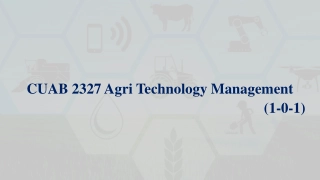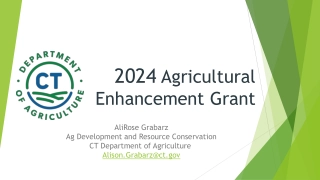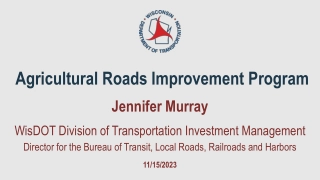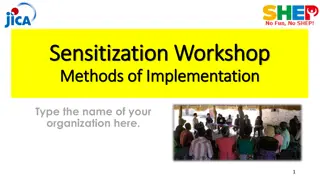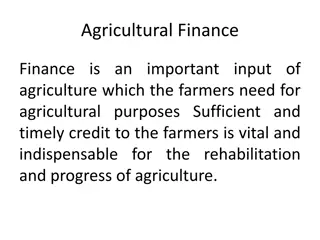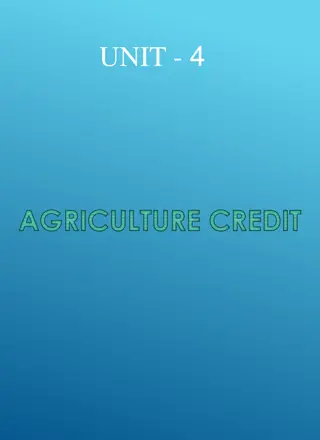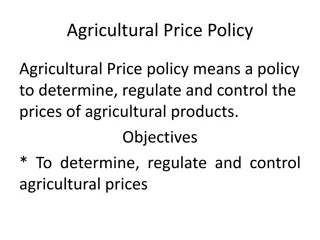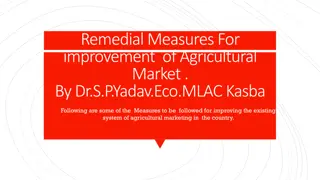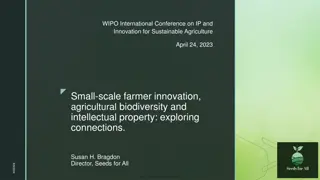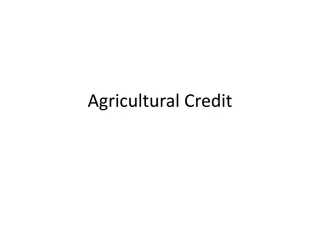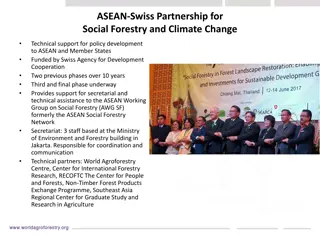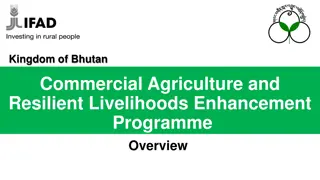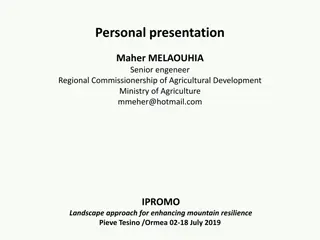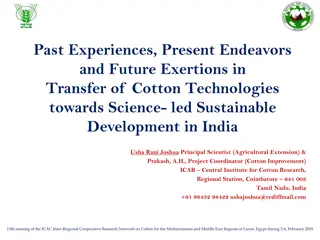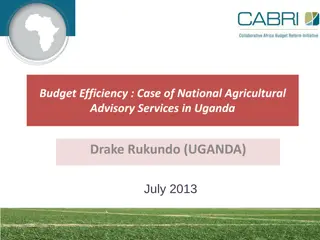
Enhancing Agricultural Research Partnership for Sustainable Development
The partnership between CABI and NARO aims to improve livelihoods in African member countries through collaborative research initiatives, knowledge solutions, and strategic alliances. NARO's focus on demand-driven research for sustainable agriculture aligns with CABI's expertise in information access, dissemination, and capacity building. Together, they work on diverse projects such as erudite information access, invasive alien species research, and promoting public awareness on biotechnology. This collaboration enhances the contribution of agricultural research to economic growth, food security, and poverty eradication.
Download Presentation

Please find below an Image/Link to download the presentation.
The content on the website is provided AS IS for your information and personal use only. It may not be sold, licensed, or shared on other websites without obtaining consent from the author. If you encounter any issues during the download, it is possible that the publisher has removed the file from their server.
You are allowed to download the files provided on this website for personal or commercial use, subject to the condition that they are used lawfully. All files are the property of their respective owners.
The content on the website is provided AS IS for your information and personal use only. It may not be sold, licensed, or shared on other websites without obtaining consent from the author.
E N D
Presentation Transcript
? CABI-NARO PARTNERSHIP FOR DEVELOPMENT J.A. AGONA, PHD DIRECTOR GENERAL NATIONAL AGRICULTURAL RESEARCH ORGANISATION dgnaro@naro.go.ug; aagona@hotmail.com IMPROVING LIVELIHOODS THROUGH KNOWLEDGE SOLUTIONS AND PARTNERSHIPS: AFRICAN MEMBER COUNTRIES REGIONAL CONSULTATION, 14-16 OCTOBER, LUSAKA, ZAMBIA
Introduction NARO s coordinate and implement research for development in all aspects of crops, livestock, fisheries, forestry and natural resources. Research agenda are demand-driven, client-oriented and market-based. Goal of NARO is to enhance the contribution of agricultural research to sustainable agricultural sustained competitiveness, growth, food security eradication. mandate is to oversee, productivity, economic and poverty 2
NARO espouses collaboration, strategic alliances, linkages and/or partnerships with agricultural related institutions at at national, regional and international levels. Such arrangements provide for exchange & sharing of technologies, info, knowledge, germplasm, and/or joint capacity building and project implementation. One such premier partnership has been with Centre for Agricultural Biosciences International (CABI) in fostering IAR4D. 3
CABI-NARO PARTNERSHIPS Uganda s involvement with CABI dates back to early 1960 s when the East Africa Station of the Commonwealth Institute of Biological Control, as it was known, but now part of CABI was established in Kawanda Research Station in 1962. Since 1995, NARO has been an active member and has directly or indirectly worked together with CABI in: Erudite info access, Invasive alien species research, PlantWise, False Codling Moth, Fertiliser Optimiser Decision Health Consortia (ISFM info materials) Tool, Africa Soils 4
Erudite Information Access CABI s Scientific publications Abstracts: Animal breeding, dairy, crop protection, nutrition, horticulture, forestry, biotechnology, economics etc. Multimedia Compendia Books E-books Interactive electronic resources crop science, machinery, All aimed at furthering science and its application 5
Information Dissemination With funding from IDRC, CABI partnered with NARO from 2002-2004 in a project on Electronic delivery of agricultural info to rural communities to meet rural farmers repackaging in user-friendly application of ICT through telecentres (community radio listening, Q&A, conducted info needs. formats, Info and mobile videos etc.) CABI, UNCST, NARO, MAAIF, NAADS and MUK established Uganda Biotechnology (UBI). Public awareness on GMOs and related technologies were promoted. CABI provided info resources and technical backstopping, including training and info management. Two NARO staff had a field attachment at CABI and 100 monographs on biotechnology donated to NARO by CABI. Initiative 6
Invasive Alien Species Project Together with Ethiopia, Ghana and Zambia, Uganda was privileged to participate in the project Removing Barriers to Invasive Plant Management in Africa that was coordinated by CABI and IUCN (The Word Conservation Union). Technical support enabled the development of the National Invasive Species Strategy Action Plan (NISSAP) and Policy Guidelines. Goal of NISSAP is to minimise the impact of IAS on aquatic and terrestrial ecosystems in Uganda for improved livelihoods, poverty reduction and sustainable economic growth. 7
Purpose of NISSAP is to guide decision making during national and sectoral planning by government and other stakeholders to to give effect to Article 8(h) of the Convention on Biological Diversity (CBD) Although significant inroads were made in the control of some IAS, Uganda is still bedevilled by alien species of high economic importance, viz. i. Congress weed (Parthenium hysterophorus) ii. Cassia (Senna spectabilis) 8
iii. Kariba weed (Salvinia molesta) iv. Water hyacinth (Eichorrnia crassipes) v. Striga (Striga hermonthica) vi. False codling moth (Thaumatotibia leucotreta) vii.Leaf miner (Tutaabsoluta) 9
Plant Health Clinics (PlantWise) Plant Health Clinics (PHCs) have been established in >70 districts in Uganda and the strategy is seen as a novelty in providing plant health advice to farmers. Single-spine agricultural extension system yet to take root. PHCs buffered and enhanced the outreach of agricultural extension, captured wider farmer demand and improved disease vigilance since 2005. In 2010 after a period of inactivity, due to changes in donor funding (Global Plant Clinics to PlantWise) plant clinics were re- activated by MAAIF and CABI. The PHCs were operationalized in the districts by local governments and non-governmental organizations. 10
PHCs viewed as the wider Plant Health System where plant laboratories, disease surveillance, research and input should be integrated. clinics, diagnostic Although the basic operations of PHCs are well understood by stakeholders, there are challenges in practical replicability and reliability of diagnosis and data management by Plant Doctors, Research and Ministry. Systematic changes are needed to formalise links between plant clinics, research laboratories stakeholders e.g. agro input suppliers application: and other key Plant clinics have become part of MAAIF policy instrument and Local Governments have increasingly shown commitments. 11
Benefits from CABI Membership Price discount of databases and assorted publications 20% of CABI s Price discount of 50% in charges on pest and disease identifications Up to 40 pest and disease samples are offered free diagnosis Securing donor funding to support IAR4D Online access to CAB abstracts and full text through Access to Global Online Research in Agriculture (AGORA). Over 80% of CABI journal abstracts available. 12
Accessed international agriculture, fisheries, food, nutrition, veterinary science and related biological, environmental and social science. over 3,400 journals high quality covering CABI offered 100 rare to find articles to NARO scientists annually from the period of 1999 to 2006 Received Compendia on Crop Protection (2000-2002) and Animal Health (2002) that combine indexed info on all scientific research, detailed datasheets, images etc. 13
What Uganda Needs: Future scenarios Specialised specialist subsets of CAB abstracts databases CABPestCD, CropCD, PlantGeneCD, (environmental quality/degradation) e.g. AgeconCD, HortCD, SoilCD, E-CD Entire range CABI compendia: Crop protection, Invasive species, Aquaculture, Animal health, Horticulture, Forestry etc. NARO has applied for CABI compendia IP access. Access to CABI s full text products: CAB e- books, Reviews, Descriptions of Fungi and Bacteria, Maps of Plant Diseases 14
Training and capacity development in info management, processing Thesaurus for NARO info staff tools and Pest and Disease identification services Training in taxonomy and digitisation of insect collection and curation Partnership in project development Collaboration agricultural research in Climate smart 15
Thank you for listening 16

